

Are All Religions the Same? Exclusivism, Inclusivism and Pluralism. AO1 Examine why some claim that only Christians can be saved. C1T3 Pluralism and Tolerance. Religious Pluralism and Theology: New Spec A2. The Blind Men and the Elephant. What is Religious Pluralism and Why is it False? 209. What Is Religious Pluralism?
Religious Diversity and Pluralism. Bishop Barron on The Limits of Tolerance. 20100302 finality Christ pluralist world. Exclusivism inclusivism pluralism overview. Rahner and hick. C1T3F Exclusivism Inclusivism Pluralism chapter. An overview of exclusivism. The DCT paper for the OCR religious studies course requires that you consider the relationship between Christianity and non-Christian religions.
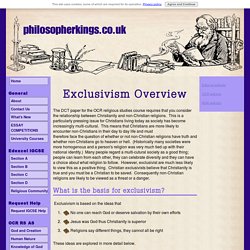
This is a particularly pressing issue for Christians living today as society has become increasingly multi-cultural. This means that Christians are more likely to encounter non-Christians in their day to day life and must therefore face the question of whether or not non-Christian religions have truth and whether non-Christians go to heaven or hell. (Historically many societies were more homogenous and a person's religion was very much tied up with their national identity.) Many people regard a multi-cutural society as a good thing; people can learn from each other, they can celebrate diversity and they can have a choice about what religion to follow. However, exclusivist are much less likely to view this as a positive thing.
Karl Barth exclusivist or universalist? Karl Barth is the named theologian for the exclusivism section of the DCT A2 paper.
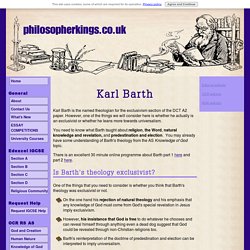
However, one of the things we will consider here is whether he actually is an exclusivist or whether he leans more towards universalism. You need to know what Barth taught about religion, the Word, natural knowledge and revelation, and predestination and election. You may already have some understanding of Barth's theology from the AS Knowledge of God topic. Overview of theological Inclusivism. The OCR DCT specification requires that you understand and can evaluate the basic principles of inclusivism.
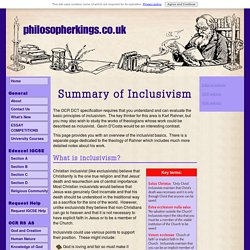
The key thinker for this area is Karl Rahner, but you may also wish to study the works of theologians whose work could be described as inclusivist. Gavin D'Costa would be an interesting contrast. This page provides you with an overview of the inclusivist basics. Karl Rahner's inclusivism. The OCR DCT specification names Karl Rahner as the inclusivist whose views you need to study.
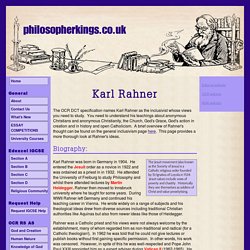
You need to understand his teachings about anonymous Christians and anonymous Christianity, the Church, God's Grace, God's action in creation and in history and open Catholicism. A brief overview of Rahner's thought can be found on the general inclusivism page here. This page provides a more thorough look at Rahner's ideas. Summary of Hick's pluralism and his global theology. Hick is the named pluralist theologian in the OCR Religious Studies A2 course.

You need to know his teachings about religion and religious experience and 'the Real'. You must understand his use of Kant and be able to explain how he reinterprets Christianity by demythologising biblical teachings and re-evaluating the concept of the divinity of Christ. You will need to consider to what extent his global theology presents a workable solution to the problem of the relationship between different religions in a multi-cultural world. The Case for Inclusivism. Declaration on the Relation of the Church to non-christian religions - Nostra Aetate. 1.
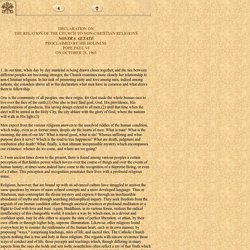
In our time, when day by day mankind is being drawn closer together, and the ties between different peoples are becoming stronger, the Church examines more closely her relationship to non-Christian religions. In her task of promoting unity and love among men, indeed among nations, she considers above all in this declaration what men have in common and what draws them to fellowship. One is the community of all peoples, one their origin, for God made the whole human race to live over the face of the earth.(1) One also is their final goal, God.
His providence, His manifestations of goodness, His saving design extend to all men,(2) until that time when the elect will be united in the Holy City, the city ablaze with the glory of God, where the nations will walk in His light.(3) Christianity and Other Religions. Growing religious diversity, global conflicts that have a religious dimension, and the modern rise of “interreligious dialogue” suggest the importance of sound Christian theological thinking about other faiths.
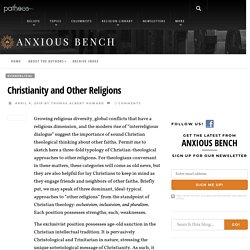
Permit me to sketch here a three-fold typology of Christian-theological approaches to other religions. For theologians conversant in these matters, these categories will come as old news, but they are also helpful for lay Christians to keep in mind as they engage friends and neighbors of other faiths. Briefly put, we may speak of three dominant, ideal-typical approaches to “other religions” from the standpoint of Christian theology: exclusivism, inclusivism, and pluralism. Each position possesses strengths; each, weaknesses. The exclusivist position possesses age-old sanction in the Christian intellectual tradition. Pluralism. Chief Rabbi Mirvis joins Sadiq Khan for interfaith Iftar at St John’s Wood shul. Chief Rabbi Ephraim Mirvis joined Sadiq Khan and religious leaders for an interfaith Iftar at St John’s Wood Synagogue on Wednesday night.
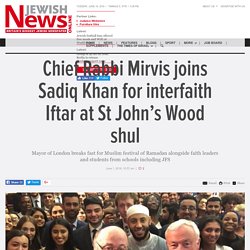
Get The Jewish News's Daily Edition by email and never miss our top stories Free Sign up! The event, organised by the Naz Legacy Foundation, was attended by pupils from a number of London schools, including JFS and Kantor King Solomon High School. 'The finality of Christ in a pluralist world' A transcript of the lecture follows: The two texts in the New Testament which clearly express the issue we're reflecting on this afternoon, are familiar ones.
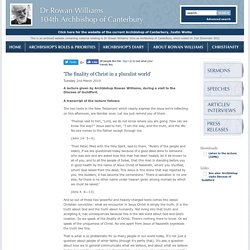
Let me just remind you of them. 'Thomas said to him, "Lord, we do not know where you are going. That Religious Studies Website: Religious Pluralism. Mo Farah targeted with racist abuse after wishing his Instagram followers a Merry Christmas. Four-time Olympic gold medallist Mo Farah has been targeted with racist messages claiming that he is not allowed to celebrate Christmas after sending his Instagram followers a goodwill gesture.
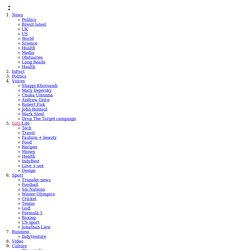
The 34-year-old long-distance runner took to social media to wish his fans a Merry Christmas, complete with a selfie of himself wearing a Santa Claus hat. However, Farah – a practicing Muslim – was targeted with a number of offensive messages that hit out at him for acknowledging Christmas due to his faith. The British Olympic great has more than 660,000 followers on Instagram, but not all of them agreed with him sending out a Christmas message and left offensive responses as a result. Peped.org Handout Hicks Religious Pluralism. Structure of Thought Religious Pluralism. Peped teaching resources: Religious pluralism and society. Starter Activity - Three Blind Men and the Elephant. Religious Pluralism and Hermeneutics. Hermeneutic approaches to religious diversity take seriously both the deep divergences between different religious traditions and the idea that diverse religions’ claims to truth should be taken seriously.
Drawing on the work of Heidegger, Ricoeur, and especially Gadamer, advocates of what may be termed “hermeneutical pluralism” attempt to understand interreligious encounters according to the models provided by textual interpretation and interpersonal conversation. Gadamer argues that a text makes a demand on the interpreter in that it presents itself as holding claims to truth that can only be adequately judged, affirmed, or denied after a careful reading in which the interpreter, to some extent, adopts the same questions as those that the text itself addresses (2002, p. 369).
John Hick and the Pluralist Hypothesis. The pluralist position put forward by John Hick has been one of the most significant and influential philosophical approaches to religious pluralism. Hick begins from the position that the world as it appears is ambiguous with regard to religion – there is no epistemological obstacle to experiencing and interpreting the world from the point of view of one religion rather than another, or indeed from a non-religious perspective (2004, p. 124).
From here, he proceeds to his central claim that religious traditions have emerged as finite, historical responses to a single transcendent, ultimate, divine reality. The diversity of traditions is a product of the diversity of religious experiences among individuals and groups throughout history, and interpretations given to these experiences. Religious Pluralism and Religious Language.
An ontologically transcendent being is somehow distinct, separate, and different from everything else. “God is more distant from any creature than any two creatures are from each other.”23Rudolf Otto’s “wholly other” is a phrase associated with this idea.24 Something with epistemological transcendence is beyond our knowledge and understanding. Evidently this could be a matter of degree.
Believers might hold that their God’s epistemological transcendence was temporary, and would vanish in an afterlife. Religious Pluralism and Salvation. Source Historically there has been one specific “diversity issue” with which philosophers have been most concerned: the question of the eternal destiny of humankind, that is, the question of who can spend eternity in God’s presence — who can obtain salvation.
Those who are religious exclusivists on this question claim that those, and only those, who have met the criteria set forth by one religious perspective can spend eternity in God’s presence.[7] Adherents of other religious perspectives, it is acknowledged, can affirm truth related to some or many issues. But with respect to the question of salvation (one’s eternal destiny), a person must come to understand and follow the unique way. It is important to note, though, that not only Christians are salvific exclusivists.
Also important to note is that differing, sometimes even conflicting, exclusivistic claims can exist within the same world religion. This contention, though, has also been challenged. Article - Hick's Transcendental Pluralism. Source: Bradley Cochran There are many general interpretations of religion. These have usually been either naturalistic, treating religions as a purely human phenomenon or, if religious, have been developed within the confines of a particular confessional conviction which construes all other traditions in its own terms. Handout - Hick's Religious Pluralism. Source. Article - the Case for Christian Exclusivism. Source In this article an evangelical Christian,Gary Crampton, sets out the Biblical and confessional case for Christian exclusivism – the view that only through Christ can people be saved and that other world religions do not offer hope of salvation.
Extract - Willliam Alston Defends Exclusivism. Source. Extract - Karl Rahner and Inclusivism. Source. Extract An Evangelical responds to Pluralism. Evangelical Minister Jerry Solomon considers Pluralism from a Christian perspective Pluralism and secularism are two prominent words that describe contemporary American culture. The Christian must live within a culture that emphasizes these terms.